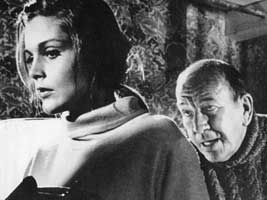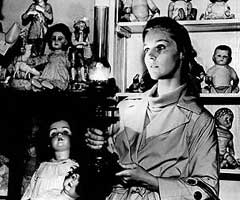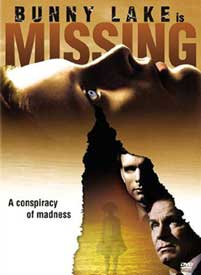Otto Preminger's Bunny Lake is Missing (1965) is a visually winning widescreen b/w film noir mystery with an extended horror climax. Ann Lake (Carol Lynley), an unwed mother, moves to England to be near her brother Stephen (Kier Dullea) who works for a London firm.
 Ann's four year old daughter has vanished from her first day in her new school. But the school claims no record of having had Bunny enrolled. Ann has no photographs of the little girl, & when the police check Ann's new apartment, there is no evidence that she even has a daughter. Ann's four year old daughter has vanished from her first day in her new school. But the school claims no record of having had Bunny enrolled. Ann has no photographs of the little girl, & when the police check Ann's new apartment, there is no evidence that she even has a daughter.
Every piece of evidence suggesting Bunny never existed is countered with a plausible (or barely plausible) explanation for why such evidence does not exist: Maybe the school removed any record of her enrollment to wheedle out of responsibility for her having gone missing. Ann had only just moved to London so didn't have her photo albums which would've been full of pictures of Bunny. Someone may have broken into the apartment & selectively stolen all of Bunny's things.
Laurence Olivier plays the police investigator trying to figure out if a little American girl has really gone missing, or if Ann & her brother live in a mutual fantasy-world. We the audience have not seen Bunny either, so the weak mystery is not what happened to her, but does she exist.
If she doesn't exist, then there's no reason to worry about her If she does exist, then someone purportedly awfully clever has pre-arranged for there to be no evidence of her existence, from the lack of identity papers to get into England to Ann dropping off Bunny in such a manner that neither we nor anyone at the school necessarily see her, & this latter is something only Ann herself had control over. The plot doesn't actually make any sense, if a viewer is so bold as to bother noticing.
That Olivier plays the detective with great subtlty & depth is in stark contrast to the two main stars who perform at the level of monotone. That Olivier makes his investigator seem real heightens the oddness of Ann & Stephen as missing a few bricks. For some while this makes it seem like only one actor out of three is competent for the role, though very likely, given the eventual plot turn, it was Preminger's directorial choice that Ann & Stephen appear slightly disconnected from events.
Anything seems possible through much of the film, but Lynley isn't a very good actress, & Dullea is an absolutely awful actor. For over half the film they remain pokerfaced & speak woodenly. In consequence the first hour of the film is rather boring, & the mystery of whether or not Bunny exists is not the least bit suspenseful. Neither Stephen nor Ann seems to be responding to the situation in a manner human beings might.
 The phony acting & intimations that both Stephen & Ann might be loonies does turn out to be required by the script, but that doesn't make the phoniness of that first full hour more tolerable. The phony acting & intimations that both Stephen & Ann might be loonies does turn out to be required by the script, but that doesn't make the phoniness of that first full hour more tolerable.
What kept me viewing were fascinating side-characters much more interesting than the main cast: The eccentric retired schoolteacher (Martita Hunt) who lives in the attic writing a book about children's fantasies & nightmares. Noel Coward as the nosy neighbor with a fat chihuahua, trying to convince the cops to select a whip from his collection to beat him with. And the geezerly doll hospital surgeon (Finlay Currie).
[SPOILER ALERT!]
The old chap at the doll hospital provides the first proof that Bunny does exist. Ann is so relieved to have proof that she's not some kind of nutcake & is eager to get the doll to the police. But Stephen is hot on Ann's trail, grabs the doll, sets it on fire, & goes all bug-eyed crazy.
The main foreshadowing of this sudden change of character is the fact that neither Ann nor Stephen were particularly believable for that first hour, their emotions ring false, & either of them could've been faking it, or living in a fantasy, or completely truthful.
But once we know Ann is sane & Stephen has an unhealthy fixation so that he cannot tolerate her love shared with anyone, we know why all evidence of Bunny has been purposefully expunged. Ann was not in collusion, despite that the fact remains that Bunny's seeming non-existence worked for as long as it did largely due to Ann's own actions that Stephen couldn't possibly have controlled.
The mystery is over. But there's a half hour of film yet to go. From this point on neither Ann nor Stephen seem to be own benzodrine; rather, she's afraid & he's completely over-the-top insane.
That last half hour has Bunny perpetually threatened by the insane Stephen while Ann tries to involve her nutty brother in a series of childhood games. He withdraws into a child persona to play blind man's bluff or hide & seek & the like, but each time Ann tries to escape with Bunny, Stephen turns back into the stalker killer.
This is dragged out a very long while, but it's attention-holding, & only too bad Preminger couldn't make the first two-thirds of the film interesting enough or rational enough to justify waiting for that non-stop-suspense of the film's final third.
However, anyone who actually was sucked into the mystery element will likely be disappointed in the climax which just isn't a reasoned outcome for the mystery previously presented.
The degree of cold calculating intellect required to very nearly succeed at erasing all evidence that Bunny existed conflicts entirely with the unreasoning lunatic who stalks around in the dark with his mood swinging between loony psycho killer & regressed to childlike.
No one that nuts would be able to hide it until Otto Preminger needed it revealed. So too Ann's false emotions over her missing child are quite a different character from the frightened but brave Ann trying to save Bunny's life.
Kier Dullea's stupid acting style finally has a context (of insanity) that makes him almost appropriate casting. Though the climax is not all that credible as the resolution of a mystery story, & the characters too over-the-top & director-manipulated for any sense of realism, even so that last half hour can be assessed as quite a good horror story. [END SPOILER ALERT]
The climax might even so be a minor masterpiece of psychological horror, even though affixed to the end of a much less effective film that requires too much patience & forgiveness. I did feel rewarded, however, as the lengthy climax so wildly pays off. And for the sake of side-performances like Noel Coward's, even the tedious first hour has its moments.
As an odd aside, the soundtrack features three songs by the Zombies, & that 1960s British Invasion pop-group even appears in the film, on the telly in a pub. i rather liked the Zombies but these songs weren't that good, & as other critics have pointed out, given the theme of Bunny Lake is Missing, it's odd that Preminger didn't have them perform their hit song "She's Not There."
copyright © by Paghat the Ratgirl
|

 Ann's four year old daughter has vanished from her first day in her new school. But the school claims no record of having had Bunny enrolled. Ann has no photographs of the little girl, & when the police check Ann's new apartment, there is no evidence that she even has a daughter.
Ann's four year old daughter has vanished from her first day in her new school. But the school claims no record of having had Bunny enrolled. Ann has no photographs of the little girl, & when the police check Ann's new apartment, there is no evidence that she even has a daughter.